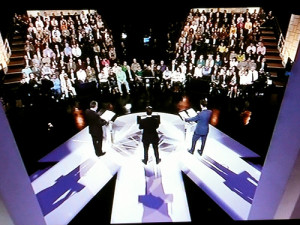If there are to be leaders debates in 2015, they must be arranged in a transparent manner
The three leadership debates held between the main party leaders in 2010 had a significant impact on the perceptions of the leaders, and the outcome of the general election itself. With the debates set to return in 2015, Judith Bara and Nicholas Allen argue that the negotiations over the rules and coverage of the debates should be conducted in a far more transparent way than in 2010 owing to their potential influence in shaping the outcome of the election.
The 2010 general election campaign saw Britain’s first ever experience of live televised leaders’ debates. Over three successive Thursdays, the leaders of the three main parties, Gordon Brown, David Cameron and Nick Clegg, went head to head for 90 minutes in front of the television cameras. They made statements, answered questions submitted by the public, and otherwise sparred with one another. Such was the anticipated interest in the debates that the whole campaign was effectively organised around them. For many, indeed, the debates were the 2010 campaign.
General elections give British democracy its meaning. Governments and MPs can be held to account and potential rascals evicted. Given the importance of the debates in the 2010 election campaign, not to mention the possibility that they had some effect on the outcome, and given the likelihood of debates taking place in 2015 (of which more later), it is surprising that there has been so little public scrutiny of the way in which the debates came to be organised and how the rules governing the debates were drawn up.
It took a long time for televised leaders’ debates to come to Britain, even though they are routine in many places. British politicians occasionally called for debates in the past, usually when they thought them to be in their interests. Broadcasters were more consistent proponents, conscious of the likely boost to their ratings. It was once again the broadcasters, led by Sky News, who pressed the case for debates in 2010. Their campaign was successful this time because Cameron and Brown both thought that it would be to their advantage to participate, or to their grave disadvantage if they did not, and also because they were now both willing to share the stage with Clegg, even though, as leader of the third party, he was not a serious prime ministerial candidate.
The rules governing the debates were hammered out between representatives of three broadcasters, BBC, ITV and Sky News, and the three largest political parties, the Conservatives, Labour and the Liberal Democrats. Other parties might well have been included but they were not. The rules were decided upon behind closed doors and presented en bloc to the public.
Under the rules, there would be three debates, each addressing a specific theme: the first debate, produced by ITV, focused on domestic affairs; the second debate, produced by Sky News, focused on international affairs; and the final debate, produced by the BBC, addressed economic affairs. Otherwise, all three debates followed the same format. Each leader delivered a one-minute opening statement. There were then four questions, pre-selected by the host broadcaster, relating to the debate theme. For every question, each leader had one minute to answer the question and a further minute to respond to the other leaders’ answers. The answers and responses were followed by four minutes of open discussion between the leaders. Once the four themed questions were asked, there were four more pre-selected questions but now on any topic. Yet again each leader had one minute to offer an initial answer, another minute to give a further response, and then there were four minutes for general debate. At the end of each programme, the leaders made one-and-a-half minute closing statements.
Our analysis of the content of the debates confirms that the agreed rules did, on the whole, constrain both the party leaders’ statements and the broadcasters’ choice of questions. A clear majority of content was devoted to the designated theme in the first and third debates, domestic affairs and the economy respectively. However, in the second debate on international affairs, just over one-third of the content was focused on the theme.
That broadcasters and politicians generally stuck to the rules is reassuring. And this brings us back to the importance of rules. The agreed rules and the broadcasters’ choice of questions were the most important factors in shaping what the leaders said. The broadcasters had an especially important role in selecting questions that covered the issues that the public wanted to—or perhaps should—know more about. To take one example, only one in five questions across all three debates prioritised the economy, despite its overwhelming importance at the time. Was the themed nature of each debate a hindrance in this regard? Was there sufficient editorial coordination among the broadcasters to ensure that all issues were adequately covered across the debates?
We do not think that the rules governing the 2010 debates were particularly bad or that the debates were a threat to the quality of democratic engagement. The broadcasters should probably be commended for mixing good television with opportunities for education and information. However, important normative questions are at stake. Should a series of events with important potential ramifications be decided behind closed doors by broadcasters and party politicians? Or should there be a more open, transparent and accountable process by which such decisions are taken? Anything that structures a whole general election campaign should be decided in a more open way. Journalists and party politicians do not have a monopoly of wisdom on what the public should be informed about. No one does.
Nor is it just the rules governing the content of the debates that matter. Thought needs to be given to how debates are covered by broadcasters. As psychological research has shown, the use of visual continuous response measures, or ‘worms’, to track the real-time responses of undecided voters, significantly affects viewers’ perceptions of who won a debate. Millions of voters’ responses may be intentionally or unintentionally distorted by the views of a small, unrepresentative sample of undecided voters. Yet, are there are no restrictions in place, and there has been little public discussion of this issue.
On the basis of recent comments by David Cameron and Nick Clegg, we can expect debates to be held in 2015. We do, however, reject Clegg’s suggestion that ‘This isn’t a subject—thankfully, perhaps—of government policy. It’s a subject of discussion between broadcasters, who will have their own views and the political parties.’
A self-selecting group of politicians and broadcasters should not decide by themselves something of such central importance to a general election campaign. Broadcasters in Britain are strictly regulated, but they are also commercial organizations. Whatever they profess, do not have pure public-service motivations. Politicians are also self-interested and have their own power-seeking motives. In 2010, both sides were concerned with establishing rules that worked to their advantage. In future, it would be desirable at least to involve an independent body, such as the Hansard Society, in the planning and oversight of debates. If the broadcasters are serious about providing their viewers with bread as well as circuses, they would do so. We also think that the subject of regulating debates could benefit from some kind of public inquiry, perhaps by a parliamentary select committee. There needs to be public discussion about how future debates can best serve the democratic process.
Note: this post represents the views of the authors and not those of Democratic Audit or the LSE. Please read our comments policy before posting. The shortened URL for this post is: https://buff.ly/1iwZY9f
 Dr Nicholas Allen is a Senior Lecturer in the Department of Politics and International Relations at Royal Holloway University of London.
Dr Nicholas Allen is a Senior Lecturer in the Department of Politics and International Relations at Royal Holloway University of London.

Dr Judith Bara is Senior Lecturer in Politics at Queen Mary University of London







 Democratic Audit's core funding is provided by the Joseph Rowntree Charitable Trust. Additional funding is provided by the London School of Economics.
Democratic Audit's core funding is provided by the Joseph Rowntree Charitable Trust. Additional funding is provided by the London School of Economics.
@GrahamAllenMP @JonAshworth Yes, but transparency required -https://t.co/bHM4LwZi9K